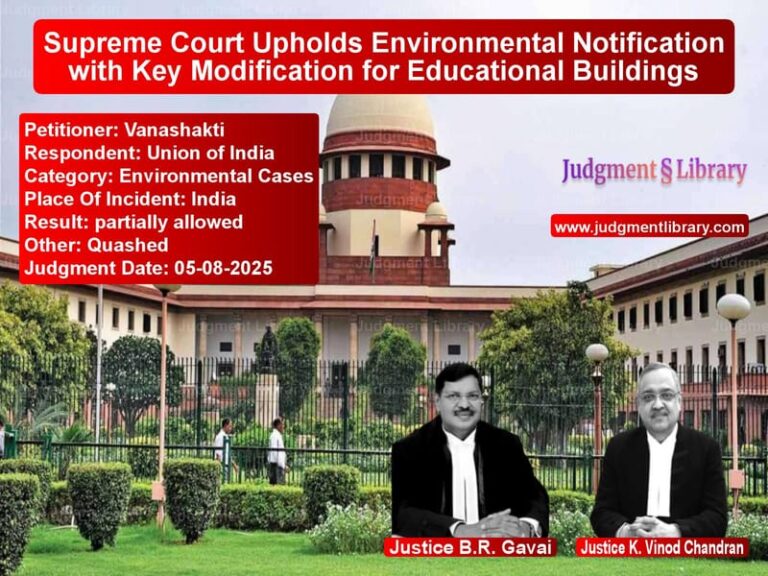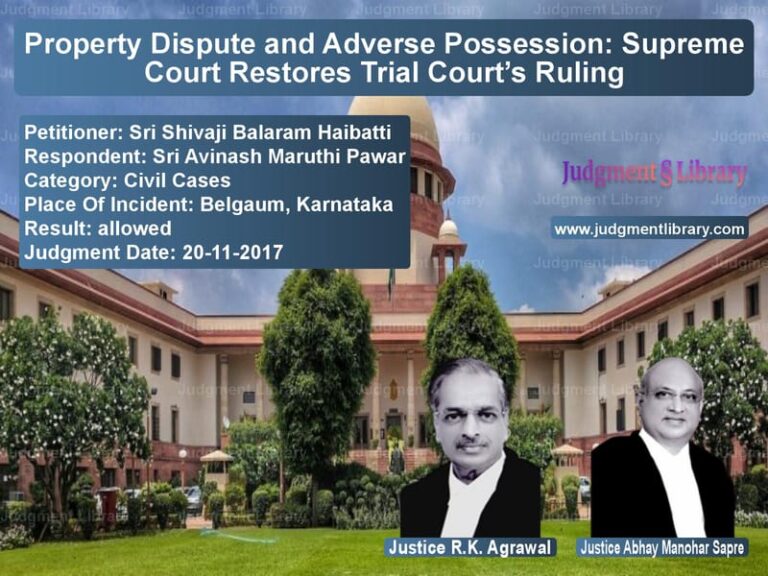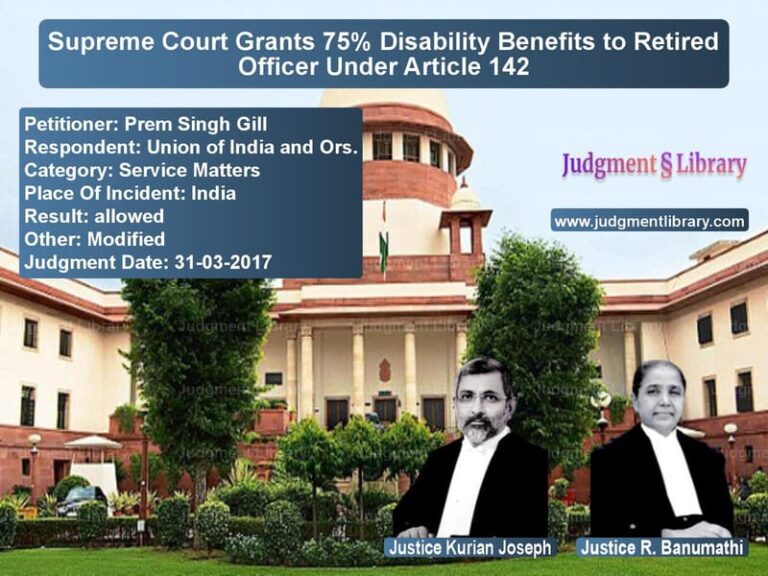Supreme Court Rules on Decades-Old Land Dispute: Sah Family Property Rights Settled
The Supreme Court of India has finally resolved a long-standing land dispute in the case of Rakesh Bhushan Prasad Alias Rakesh Prasad and Others vs. Radha Devi (D) by LRs. and Others. This case, which has been ongoing since 1967, involved a complex legal battle over the ownership of ancestral land in Sitamarhi, Bihar. The Court ruled in favor of the appellants, the legal heirs of Krishna Kant Prasad, affirming that the plaintiffs had failed to establish ownership over the disputed land.
The case originally stemmed from conflicting claims within the Sah family, with one faction arguing that the land was always part of their inheritance and the other asserting that it had been lawfully occupied by Krishna Kant Prasad. The litigation spanned multiple decades and judicial levels before reaching the Supreme Court, which delivered its final verdict on September 7, 2021.
Background of the Case
The case was initiated by Banaras Sah, who filed Title Suit No. 73 of 1967, claiming ownership of 6 kathas of land located in Parihar, Sitamarhi, Bihar. He alleged that the land had always belonged to his family and had been given to Krishna Kant Prasad on a temporary basis, without conferring any ownership rights.
On the other hand, Krishna Kant Prasad, who was a doctor and had settled in Parihar after resigning from government service, argued that he had been in possession of the land since 1948. He contended that the land had been given to him in recognition of his medical services to the Sah family and others in the area. Furthermore, he asserted that he had made permanent constructions on the land, reinforcing his claim of ownership.
Key Legal Issues
The main questions before the Supreme Court were:
- Did the plaintiffs (Banaras Sah and his legal heirs) have valid ownership rights over the disputed land?
- Was the possession of Krishna Kant Prasad legally recognized?
- What was the effect of past partition records and land mutation proceedings?
Arguments by the Petitioner (Legal Heirs of Krishna Kant Prasad)
- The petitioner argued that Krishna Kant Prasad had been in possession of the land for decades and had made significant constructions.
- They provided land mutation records from 1960 that showed Krishna Kant Prasad’s name as the recorded owner.
- The partition records of the Sah family demonstrated that the plaintiffs did not have clear ownership over the land.
- The petitioners argued that even if the plaintiffs had historical claims, they had failed to assert them within the required legal time frame.
Arguments by the Respondent (Legal Heirs of Banaras Sah)
- The respondents claimed that the land was part of their ancestral property and had never been formally transferred to Krishna Kant Prasad.
- They argued that Krishna Kant Prasad was initially allowed to occupy the land temporarily, with the understanding that he would vacate it upon request.
- The respondents relied on witness depositions that suggested that their family had always been recognized as the true owners.
Supreme Court’s Observations
- The Court found that the plaintiffs failed to provide documentary proof of ownership.
- The partition records and final decrees clearly indicated that the land belonged to the Gudar Sah group, not to the plaintiffs.
- The mutation records supported Krishna Kant Prasad’s long-term possession, and no objections had been raised at the time of mutation.
- The oral testimonies presented by the plaintiffs were not sufficient to establish ownership, especially in the absence of formal land records.
Historical Context and Family Dispute
The Sah family’s history was crucial to the dispute. The family was divided into two main branches: the Gudar Sah group and the Shibshankar Sah group. The plaintiffs belonged to the Shibshankar Sah group and claimed that the disputed land was part of their inheritance. However, the Court found that the land had actually been assigned to the Gudar Sah group in past partitions.
The key historical records examined included:
- The oral partition of 1921, which divided the family’s properties.
- The partition suit of 1941, which reaffirmed the division of properties.
- Land mutation records from 1960, listing Krishna Kant Prasad as the possessor.
Effect of Past Legal Proceedings
One of the most critical aspects of the case was the previous litigation surrounding the Sah family’s property. The Supreme Court reviewed multiple past legal documents, including:
- The 1941 partition suit, which clearly identified property allocations.
- The 1960 land mutation records, which were approved in favor of Krishna Kant Prasad.
- The trial court’s judgment from 1986, which had dismissed the plaintiffs’ claims.
The Court emphasized that when clear documentary evidence exists, oral statements and later claims cannot override past legal rulings.
Final Verdict and Order
- The Supreme Court allowed the appeal and set aside the High Court’s ruling.
- The plaintiffs (legal heirs of Banaras Sah) were found to have failed in establishing ownership.
- The original title suit filed in 1967 was dismissed.
- The judgment reinforced the importance of land records and legal documentation in property disputes.
Implications of the Judgment
This ruling is significant for multiple reasons:
- It underscores the importance of clear documentation in property disputes.
- It reinforces the principle that long-term possession, coupled with legal recognition through mutation, holds weight in ownership claims.
- It sets a precedent for resolving disputes involving historical family partitions.
- It highlights that legal heirs must assert their claims within a reasonable time frame to avoid adverse rulings.
In conclusion, the Supreme Court’s ruling in this case provides a critical lesson in property law: claims must be supported by documented evidence, and long-term possession cannot be easily overridden by oral assertions or delayed legal action. The ruling brings an end to a dispute that had lasted over 50 years, ensuring clarity and finality in property ownership rights.
Petitioner Name: Rakesh Bhushan Prasad Alias Rakesh Prasad and Others.Respondent Name: Radha Devi (D) by LRs. and Others.Judgment By: Justice A.M. Khanwilkar, Justice Sanjiv Khanna.Place Of Incident: Sitamarhi, Bihar.Judgment Date: 07-09-2021.
Don’t miss out on the full details! Download the complete judgment in PDF format below and gain valuable insights instantly!
Download Judgment: rakesh-bhushan-prasa-vs-radha-devi-(d)-by-lr-supreme-court-of-india-judgment-dated-07-09-2021.pdf
Directly Download Judgment: Directly download this Judgment
See all petitions in Property Disputes
See all petitions in Landlord-Tenant Disputes
See all petitions in Judgment by A M Khanwilkar
See all petitions in Judgment by Sanjiv Khanna
See all petitions in allowed
See all petitions in supreme court of India judgments September 2021
See all petitions in 2021 judgments
See all posts in Civil Cases Category
See all allowed petitions in Civil Cases Category
See all Dismissed petitions in Civil Cases Category
See all partially allowed petitions in Civil Cases Category







